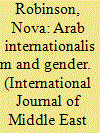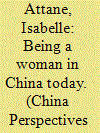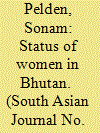|
|
|
Sort Order |
|
|
|
Items / Page
|
|
|
|
|
|
|
| Srl | Item |
| 1 |
ID:
146986


|
|
|
|
|
| Summary/Abstract |
Historians of the Middle East have used gender to explore a range of topics, from how crises around gendered practices have contributed to the construction of national identities to women's roles in nationalist movements. Whereas early gender histories focused on single nation-states, recent scholarship has turned to regional and transnational connections. Yet the international sphere, the domain of nation-states and nongovernmental organizations in relation to each other, has yet to be examined through the lens of gender. In this essay, I argue that doing so yields new insights into the relationship between the national and the international in the Middle East, and into the process of rights claiming in postcolonial nation-states. I make this argument through a discussion of the third session of the United Nations Commission on the Status of Women (UNCSW).
|
|
|
|
|
|
|
|
|
|
|
|
|
|
|
|
| 2 |
ID:
116540


|
|
|
|
|
| Publication |
2012.
|
| Summary/Abstract |
The aim of this article is on the one hand, to draw up a socio-demographic inventory of the situation of Chinese women in the prevailing early twenty-first century context of demographic, economic, and social transition, and on the other hand, to draw attention to the paradoxical effects of these transitions whilst taking into account the diversity of the realities women are experiencing. In conclusion, it raises the possibility of changes in gender relationships in China, where there are, and will continue to be, fewer women than men, particularly in adulthood.
|
|
|
|
|
|
|
|
|
|
|
|
|
|
|
|
| 3 |
ID:
130031


|
|
|
|
|
| Publication |
2014.
|
| Summary/Abstract |
Woman and man have been complimentary to each other in the case of creation of a new entity in general and in continuity of the world in particular. But, ever since the dawn of human civilization, the history shows that women have been treated in almost all the societies of the world as a second-rated citizen despite the fact they constitute numerically half of the entire human population. In the past when Siddh?rtha Gautama, the Buddha and Gandhiji were dwelling on this planet, the condition of the women was not better than to-day. They were decorative pieces, object of sensual gratifications of male, and almost confined to the household work. Moreover, they were deprived of education, one of the basic necessities of mental development. In such a situation, the views expressed by the Buddha and Gandhiji could be a mirror to evaluate the place of women in the society.
|
|
|
|
|
|
|
|
|
|
|
|
|
|
|
|
| 4 |
ID:
171117


|
|
|
|
|
| Summary/Abstract |
Global norm-setting to advance women's rights has historically been a fertile area for feminist activism. These efforts in multilateral institutions have also, however, attracted a transnationally coordinated backlash. Initially spearheaded by the Vatican, the right-wing backlash has consolidated into a curious coalition that now includes authoritarian and right-wing populist regimes and bridges significant differences of religious belief, regime type, and ideology. Hostility to feminism has proven to be a valuable point of connection between interests that otherwise have little in common. Some tensions between feminist groups have been exploited by right-wing interests, in particular over sex workers' rights and the use of technology to alter the interpretation and experience of sexuality, reproduction, and gender (transgender issues, surrogacy, sex-selective abortion, and sexuality and disability). This essay reviews a recent instance of right-wing coordination, seen in the nearly successful effort to derail the 2019 meeting of the UN Commission on the Status of Women. It examines the strategic responses of transnational feminist movements to this backlash in multilateral institutions, including their exploration of new transnational policy issues and experimentation with hybrid transnational spaces.
|
|
|
|
|
|
|
|
|
|
|
|
|
|
|
|
| 5 |
ID:
129481


|
|
|
|
|
| Publication |
2014.
|
| Summary/Abstract |
This paper compares the status of women in Chile and Taiwan in order to examine two research questions: First, what can explain Taiwan's considerably better record in enhancing the status of women? Second, what are the implications for the ongoing debate among global feminists about the effects of globalization on the status of women? Case studies of the two countries suggest that they are fairly similar in terms of progress on women's education and health, but that Taiwan has a very significant advantage in terms of women's employment status and political representation. Taiwan's better performance in these areas reflects its distinctive development pattern and electoral institutions, while the implications of the case studies for the nature of globalization's effects on the status of women are more complex and nuanced.
|
|
|
|
|
|
|
|
|
|
|
|
|
|
|
|
| 6 |
ID:
088310


|
|
|
|
|
| Publication |
2009.
|
| Summary/Abstract |
Bhutanese women in the 1970s and 1980s played a significant role in the agricultural workforce, where they outnumbered men, who were joining the service sector and other urban industrial and commercail activities.
|
|
|
|
|
|
|
|
|
|
|
|
|
|
|
|
|
|
|
|
|